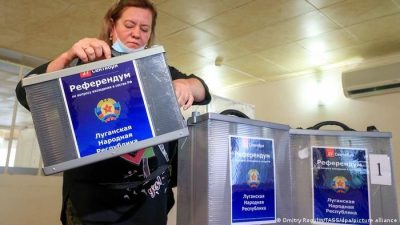LPR, DPR, Kherson and Zaporozhye Vote for Reunification with Russia
All four regions have said their word; they voted overwhelmingly in favor of joining Russia.

All Global Research articles can be read in 51 languages by activating the Translate This Article button below the author’s name.
To receive Global Research’s Daily Newsletter (selected articles), click here.
Follow us on Instagram and Twitter and subscribe to our Telegram Channel. Feel free to repost and share widely Global Research articles.
***
The results of the referenda on the accession of the Lugansk People’s Republic (LPR), Donetsk People’s Republic (DPR), as well as the Kherson and Zaporozhye regions to the country, have been released by Moscow.
The head of the regional electoral committee Galina Katyushchenko declared that 93.11% of voters supported reunification with Russia, as 100% of ballots have been counted in the Zaporozhye Region.
Lugansk People’s Republic
In the Lugansk People’s Republic (LPR), 98.42% of voters backed accession to Russia, as per the head of the regional electoral committee, Elena Kravchenko.
“With 100% of the protocols of precinct commissions processed, 98.42% voted for the republic’s entry into the Russian Federation,” Kravchenko said.
Kherson
In the Kherson region, 87.05% of voters supported reunification with Russia, according to the head of the regional election commission, Marina Zakharova.
“A total of 497,051 (87.05%) participants in the referendum answered ‘Yes’ to the question put forward at the referendum ‘Are for the withdrawal of the Kherson region from Ukraine, the formation of an independent state by the Kherson region and its entry into the Russian Federation as a constituent entity of the Russian Federation?'” she said.
Donetsk People’s Republic
With all referenda counted, Donetsk People’s Republic (DPR) reported 99.23% of voters in favor of becoming part of Russia.
There were 2,133,326 voters who voted, accounting for 97.51% of the total number of voters, as per the DPR central election commission.
Meanwhile, more than a hundred foreign observers from 40 countries, excluding specialists from Russia, attending the referenda in the Lugansk and Donetsk people’s republics, as well as in the Zaporozhye and Kherson regions, on joining the Russian Federation, reported no violations, with the exception of threats and shelling from Ukraine.
The voting in the referenda of DPR, LPR, Zaporozhye, and Kherson’s accession to the Russian Federation has begun early on Friday.
Residents of the Zaporozhye and Kherson areas joined the initiative last Tuesday after local public organizations submitted identical demands to their authorities.
Russian President Vladimir Putin has lately indicated in a televised address last Wednesday that Russia will support the referenda results.
NATO countries came together to condemn the referenda, according to a statement revealed last Thursday.
On his account, EU foreign policy chief Josep Borrell has lately threatened Russia with new sanctions in the event of referenda after White House National Security Advisor Jake Sullivan stated that the US condemned the DPR, LPR, Zaporozhye, and Kherson referenda to join Russia as “sham” actions and asserted that the US would not recognize the results.
The referenda, according to Sullivan, and a reported Russian plan to mobilize more soldiers, reflect Moscow’s recent military defeats, including ceding sizable amounts of land to the Ukrainian military.
Since the beginning of the war in Ukraine, the Russian military took control of the Azov part of Zaporozhye and Kherson, liberating large cities, such as Kherson, Melitopol, and Berdiansk, and cutting off Kiev from the Sea of Azov.
*
Note to readers: Please click the share buttons above or below. Follow us on Instagram and Twitter and subscribe to our Telegram Channel. Feel free to repost and share widely Global Research articles.
Featured image: A woman voting in a referendum (Source: Al Mayadeen English)

